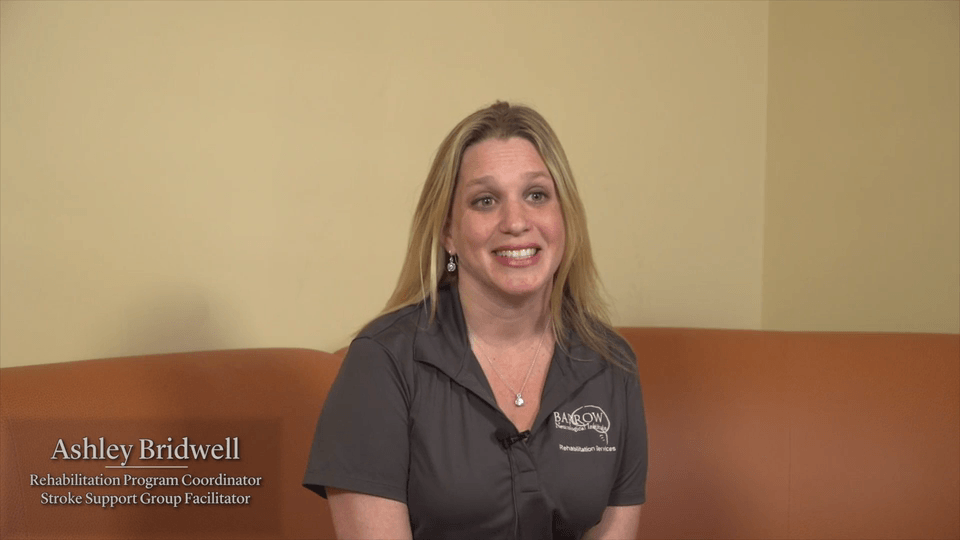
Stroke Support Group Demonstrates Strength in Numbers
Seventeen years ago last month, Harry Hensell was at a restaurant with his wife and grandkids following a family camping trip when he had an ischemic stroke, which he would later learn was related to a hole in his heart.
“He went to the restroom, and my grandkids came out and said, ‘Grandma, you’ve got to go into the bathroom whether you’re allowed to or not because something’s wrong with Pop,’ ” his wife, Mary Hensell, recalled. “I took one look at him and recognized the symptoms, so we called 911.”
Harry Hensell was airlifted to Barrow Neurological Institute, where he and his wife have been participating in the Stroke Support Group ever since.
“It gets us out of the house, and it gets us to visit with other people and find out we’re not alone in this,” she said.
Ashley Bridwell, who has been facilitating the support group for the past 13 years, said that on average about 10 to 15 people attend the monthly meetings either to hear from educational speakers such as nutritionists and psychologists or have an open discussion about what they’re going through.
“We learn about different things every time we come,” Mary Hensell said. “And it’s great because it’s a family.”
Bridwell said the support group is open to the community. Stroke survivors are not required to have received treatment at Barrow to participate, and caregivers and family members are also encouraged to attend.
It really builds a community of resilience, a community of strength, a community of people who want to help take care of each other.
-Ashley Bridwell, Stroke Support Group Facilitator
“Initially, people come in and they’re a little nervous and not sure what to expect, but after a few months people become family,” she said. “These people are family to me and to each other, and it’s a really wonderful network of community members that come together once a month to really share and take care of each other.”
Renee DeSalvo, 63, has been participating in the group for more than five years and said it has helped her turn a negative experience into a positive one.
“When you’re positive, it’ll make you happier and smile a lot,” she said. “That’s what helped me to get healed.”
DeSalvo had a hemorrhagic stroke about 10 years ago caused by an arteriovenous malformation (AVM), a tangle of abnormal blood vessels that is usually present at birth but can go undetected for many years. These blood vessels can dilate over time and eventually rupture, causing bleeding into the brain.
“I had to learn everything all over again,” DeSalvo said. “I didn’t know colors or names or my kids. I’d seen pictures of them, but I didn’t know my own family’s names.”
Stroke is the No. 1 cause of long-term disability among adults. Harry Hensell, who is now 84 years old, lost the right peripheral vision in both of his eyes, experiences short-term memory loss, and has weakness on the right side of his body.
DeSalvo’s stroke also left her with partial blindness, but she said she is just grateful to be alive. She called her neurosurgeon, Dr. Robert Spetzler, her miracle doctor.
In the United States, stroke is the fifth leading cause of death. According to the American Stroke Association, someone dies from a stroke every four minutes. The risk of death related to an AVM bleed is 10 to 15 percent.
With about 795,000 Americans having a stroke every year, DeSalvo and Harry Hensell are far from alone, which is something survivors and caregivers are reminded of when they attend the Stroke Support Group at Barrow.
“When somebody says something about how they’re feeling or what’s happening in their life and somebody across the room identifies with what’s just been said … you can almost see it in the person’s face when they have that epiphany or that magic moment of, thank goodness, I’m not alone in this,” Bridwell said. “It really builds a community of resilience, a community of strength, a community of people who want to help take care of each other.”
Bridwell said the support group also gets together for lunch at restaurants and has a holiday party every December.
Mary Hensell said it’s ultimately the people, including Bridwell, who keep her and her husband coming back month after month and year after year.
“The group is wonderful,” she said. “If anybody can join a group for the support that they give, it’s very important.”
The Stroke Support Group meets the first Tuesday of every month from noon to 1 PM. For more information, call (602) 406-6688.

